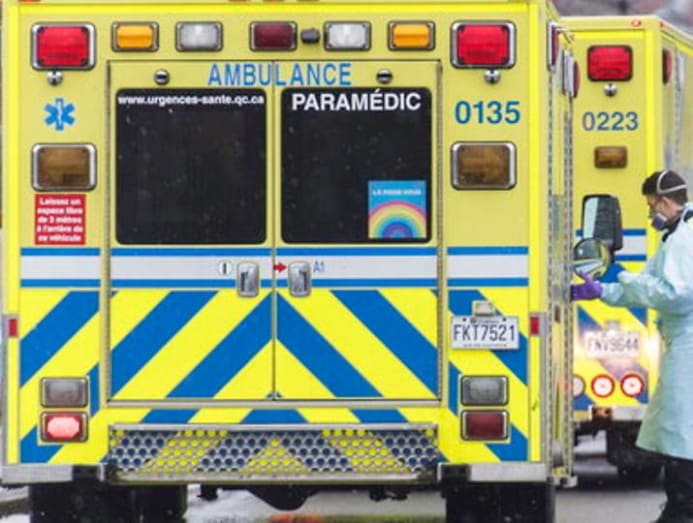Commentary: Sleep-deprived healthcare workers and paramedics can’t care for patients to the best of their abilities
CALGARY, Canada: A lack of sleep affects people'south ability to feel for others. Sleep deprivation and emotional fatigue can striking anyone, only showtime responders and healthcare workers are particularly vulnerable due to shift work, long hours and the overall stressful nature of their jobs.
This is relevant during a pandemic when the healthcare systems of many countries have been overwhelmed by the increasing number of people in hospitals.
Our research found that sleep-deprived paramedics are less able to understand how their patients feel.
Bear on OF Slumber LOSS ON MOOD AND EMOTIONS
When you don't sleep, you can't react every bit quickly, remember data, solve problems, make plans, multitask or regulate and empathise emotions as well as you could if you were well rested. It'southward well known that not getting enough sleep alters mood and emotions — think how grumpy you feel the side by side solar day if yous stay upwards all dark.
But we know less virtually how lack of sleep impacts more complex emotional processes. Moods and emotions are frequently idea of as the same thing. In reality, they are very different.
Moods are short-lived, aren't linked to a item outcome and are either positive or negative. The last time you had a "mood swing", you probably felt keen and then terrible, only may not take been able to pinpoint the cause.
Emotions are learned responses to situations or people. They come in different shades and intensities. For instance, the emotion of fright may come at the sight of a bear in the forest.
It'south difficult enough to understand our own emotions, just what nigh understanding other people's emotions?

SLEEP LOSS AFFECTS EMPATHY
Empathy is the ability to understand someone else'southward emotions, to put yourself in someone else's shoes.
In 2014, in collaboration with Neurolab, directed by cognitive neuroscience professor Giuseppe Iaria, we designed a study to empathise how a unmarried night without slumber would touch people's ability to understand the emotions of others.
Nosotros developed a figurer test that shows participants images of people in negative, positive and neutral situations, for example, people in hurting, people laughing and dancing or people simply sitting at a table. Nosotros then asked participants to commencement draw what the people in the photo were feeling and then how strong their own emotions were while looking at the pictures.
We used this test to measure out empathy in a group of academy students. Kickoff we tested everyone to understand how empathetic they were ordinarily. Then we had a grouping spend the night in the lab where we kept them awake by playing board games, socialising and watching movies.
After they had been awake all night, we re-tested them and compared their results to students who were sent home to have a skilful night of sleep.
Healthcare professionals are nevertheless fighting COVID-19 subsequently 20 months on the frontlines. 2 doctors counterbalance in on how hospitals are coping with the recent surge on CNA's Heart of the Matter:
Our findings were clear: Sleep-deprived students felt less empathy for people in negative situations than students who had had a skilful night's sleep.
But is it only extreme sleep deprivation, similar staying upward all night, that triggers this change?
POOR Slumber QUALITY IN PARAMEDICS
We found that chronic poor sleep quality was also linked with lower empathy for others. One group of people that experiences chronic sleep loss due to job schedule is paramedics.
Following a shift work schedule for many years affects paramedics' sleep quality. Paramedics are also the first to respond to patients in stressful and traumatic situations, so having empathy is an important part of their job.
Using the same figurer task we previously used with students, nosotros tested paramedics with more five years of experience and trainees who were studying to become paramedics.
Experienced paramedics reported poor quality of slumber and low empathy compared to trainees. They also told us about their years of sleep issues and how they felt numb to other people's hurting.
Emotional numbing, lack of empathy and sleep disturbances are some of the symptoms experienced by people who suffer from post-traumatic stress disorder (PTSD). These symptoms increase the risk of suicide.
According to Canadian statistics from the Heart for Suicide Prevention, get-go responders are twice equally likely to experience PTSD than the general population. About 22 per cent of paramedics volition develop PTSD at some point in their life.
During the coronavirus pandemic frontline workers worldwide are experiencing more symptoms of insomnia, anxiety, depression and PTSD. Recent media coverage has helped bring this to the public's attention, reporting on a dramatic shortage of staff and poor working weather condition in many provinces in Canada during the tertiary and fourth waves. Even so, policymakers tend to fall behind.
Our enquiry shows that overworked healthcare professionals are less empathetic to their patients' needs compared to when they are well-rested. This finding should guide policy to ensure our healthcare workers get the rest they need to assistance their patients to the best of their abilities.
Veronica Guadagni is a postdoctoral beau in cerebral neuroscience at the Academy of Calgary. This commentary first appeared on The Conversation.
0 Response to "Commentary: Sleep-deprived healthcare workers and paramedics can’t care for patients to the best of their abilities"
Post a Comment